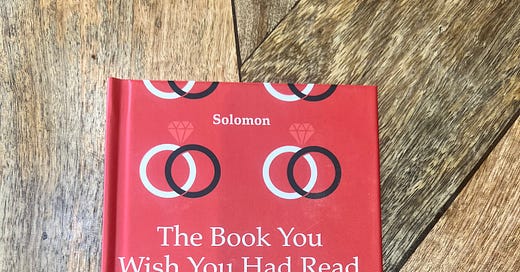couldn't think of a title, but it's about trying to be a better spouse.
does time heal all wounds or does it just widen the gap?
Another two-week hiatus hides face in shame. I am trying my best, honestly. Of course, life gets in the way, but also writing about marriage is hard. This comes from the guy with an 80,000-word novel (and one self-published essay book) about marriage sitting in my Google hard drive. Whenever I open an empty document, I struggle with the idea that people think I have it all figured out. Issues in my marriage impact my writing, and I struggle to find the solutions, let alone the words to justify them. It feels like teaching a subject you haven’t finished learning. Yet, even when it’s hard, here I am again. I am so much smarter on this page than I am off it. It’s easy to articulate the problems when you can copy and paste the emotions or erase the inconsistencies — you can’t do that in an argument. Is that what makes relationships difficult?
Marriage might be easier if it came with a pause button.
‘Why would you say that?’ Wife says, ‘That was uncalled for.’
At this point, we deep dive into the ‘Husband Brain’: Obviously, I didn’t mean it like that, it was a joke, why is she taking it so personally — what time is the match on?
‘Relax, babes,’ Husband replies.
‘But you hurt my feelings.’
Husband Brain: Oh Lord. Just apologize — think the match starts soon.
‘I’m sorry.’
‘But why did you say that…no, don’t pick up the remote… why would you even think that? What did I do to make you think so low of me?
‘Babes, I said. I’m sorry. Why do you keep going on about it! It’s not that deep at all.’
PAUSE
Imagine a PAUSE button before, a remote control soaring across the room, only just missing a confused husband, and the argument devolves into ‘he says, she says, this is how YOU should or should not feel' territory. A PAUSE, can turn ‘it’s not that deep’ into ‘it’s not that deep to me, but why is it to her?’
Empathy. It goes both ways.
Empathy prevents arguments, but too often, we are too busy or emotionally charged to find it. In marriage, people don’t always fall out of love, I think they run out of time to PAUSE. More accurately, they re-prioritize their time, not physical time, but mental time. A couple more seconds to think about ‘them’ and not me. There used to be so much time to think about how my wife felt. Before the career (which barely existed at 21), the kids, the mounting expenses, and the future. More time to PAUSE. More time to find solutions, more time to write newsletters discussing what went wrong and why. Nobody tells you how much time love requires. A brief momentary pause in the everyday responsibilities of husband, father, partner. They mention effort, perseverance, endurance, they say spend time together, spend time talking, but they never say, spend time thinking about your partner’s emotions.
The miscalculation is that we assume we know how our partner feels because they have told us, even reinforced it via messages, emails, and memes. Yet, we don’t delve into why they feel like that — there I go, sounding like I know what I’m talking about again.
Time is a double-edged sword. It can heal wounds, but it can also widen the gap. If you use it the wrong way, it tilts the scales of happiness in either direction.
Hope some of this made sense (or is atleast useful).
Anyway, here is a more coherent extract from The Book You Wish You Had Read Before Marriage:
The repeated complaints matter. The recurring arguments have significance. Asking your partner to stop complaining about a problem without addressing it is asking them to stop caring about finding a solution. A relationship isn’t developed through pretending the problem doesn’t exist; avoidance is a gateway to resentment.
Resolving the issues in a marriage should not be an exercise in character assassin-ation. Communication is not a cussing; it’s working to address those habits that plague a marriage.
Arguments in a relationship can be healthy, but it all depends on how you resolve them. Discuss every argument. Not between slammed doors or angry stomps out of the house, give yourself time to process the argument. Discussing an argument is not as simple as ‘I love you’ ‘It doesn’t matter’ or ‘I’m sorry’. Do not forgive and forget. Discuss and forgive. Resolve and forgive. Apologies shouldn’t be offered; they should be understood. Without understanding, issues cling to the heels of your relationship and grow until they become anchors preventing the relationship from moving past a particular point.
In a marriage, you don’t just learn how to apologize, you must learn why to apologize. If you sacrifice your reasons for anger and pride, you don’t argue, you communicate.
Download The Book You Wish You Had Read Before Marriage: Physical Digital E-book or Listen to the Audio Book (It’s only 30 mins). Also on Amazon.




